I was very worried about creepy crawlies, but I needn't have worried! I loved every minute of this!
Emma B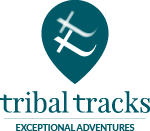
Location
Difficulty
Accommodation and Meals
Wild Camping, Guesthouse, Lodge, Hotel
Duration
8 days
Meeting Point
San Jose, Costa Rica
Annual Leave
5 days
Group Size
Up to 18
Seasons
November to April
Walking Distance
90km
Meet Charlie, a director of, and one of the co-founders of Tribal Tracks.
Be a part of this unique trek, in the spectacular rainforest of the Pacuare Valley.
Experience the best of the jungle, and get to see nature up close, as we trek along jungle paths and trails.
Chat to the locals in the communities we pass through, and learn about their way of life and the crops they farm.
All the info you need
Trip Details
This challenge is truly tropical adventure through the beautiful scenery of the Pacuare River valley.
Located in the Caribbean region of Costa Rica, this is one of the most important protected areas in the whole of Costa Rica. Its proximity to the lowlands and its high annual rainfall nurture the complex life systems which makes for extraordinary scenic beauty.
The area is most famous for the Pacuare River, which flows over 100km into the Caribbean Sea. We have the privilege of trekking along its valley, following the course of the river and experiencing the best the jungle has to offer. We wild camp in remote locations, listening to the calls from the jungle, and also close to villages, where we can learn from the local communities.
Please note international flights from UK to San Jose are not included, please contact Charlie at charlotte@tribaltracks.co.uk if you would like help with booking your flights.
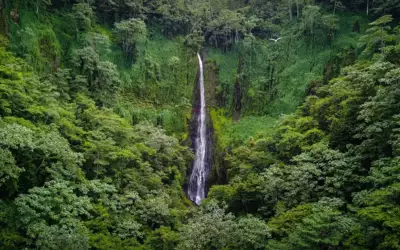
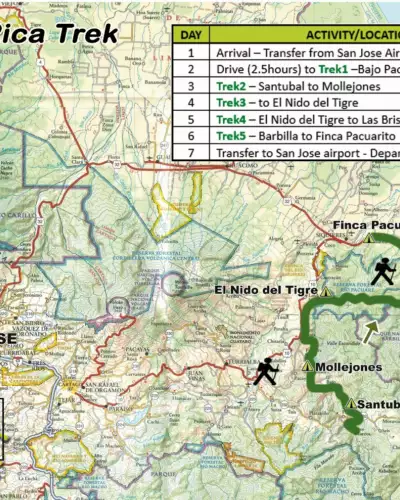
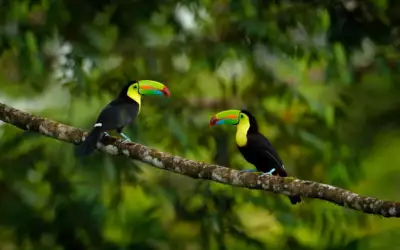
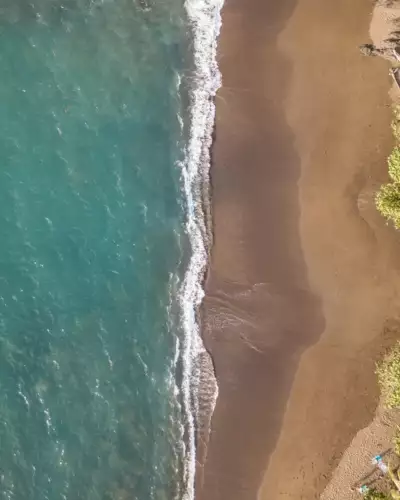
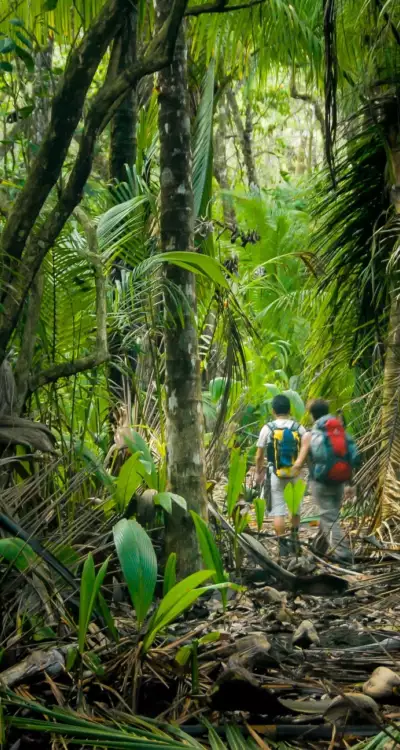
Trip Details
We leave London Heathrow for our flight to Juan Santa Maria International Airport, San Jose.
We arrive into San Jose in the evening — we will be met by our local team in San Jose and transfer to our hotel for the night. Tonight, we will prepare for our exciting jungle trek ahead.
Accommodation and Meals
Overnight San Jose 3* hotel. Dinner.
This morning we transfer (2hrs) to the start of the trek located in the village of Santubal and begin our journey through the Pacuare River Valley to the Caribbean lowlands.
This morning, we drive for around two hours to the village of Bajo, where our trek begins. Our journey takes us through the stunning Pacuare River Valley, gradually descending towards the Caribbean lowlands. We start on a rugged 4x4 track before transitioning to a narrow forest trail, immersing ourselves in the lush surroundings. The day ends with a swing bridge across the Pacuare River before tackling the final climb to our campsite. Tonight, we camp in the remote village of Santubal, surrounded by nature and the sounds of the jungle.
Distance: 11km
Ascent: 500m
Descent: 320m
Accommodation and Meals
Overnight camping Santubal. Full board.
Today we head down river.
Today’s route takes us alongside the Pacuare as we follow it down river. Coming to an impassable river canyon, we leave the valley floor and head steeply uphill into the mountains, where we thread our way through dense vegetation and hilly ridges. The scenery is incredible and one of the day’s highlights is the chance to gain some insight into the unique way of life of the people in the indigenous settlements we pass. The last 10 kms of the day area along 4x4 roads giving us a chance to look for wildlife, enjoy the views and get to know the other participants. Tonight we camp on the at the town of Mollejones, where the locals will teach some dancing and their way of living.
Distance: 19km
Ascent: 905m
Descent: 940m
Accommodation and Meals
Overnight camping Mollejones. Full board.
Today we continue our journey down the Pacuare Valley.
Our route takes us along farm roads and through several sections of trail. The views of the valley below are amazing. At the end of the day we arrive at our rustic but comfortable riverside camp, El Nido del Tigre, where you can relax in a hammock, lulled by the sounds of the river and the rainforest, looking out for toucans overhead. Time permitting, there may be a chance for a refreshing river swim on arrival.
The camp is made up of tents on fixed platforms with shared facilities and an open-air dining area. There is no electricity or hot water, making it a wild and authentic experience in nature. It is the perfect place for wildlife spotting.
Distance: 22km
Ascent: 890m
Descent: 940m
Accommodation and Meals
Overnight camping El Nido del Tigre. Full board.
We have an early start to give us maximum time to get through the toughest day of our journey.
We begin by taking a self-propelled cable car across the river where we follow the untamed trails through the rainforest. We pass several indigenous settlements as we head deeper into the forest The constant undulations in difficult terrain will make for a very challenging day!
We emerge from the rainforest near the Ranger Station of Barbilla National Park, and tonight we camp at the local school.
Distance: 15km
Ascent: 990m
Descent: 640m
Accommodation and Meals
Overnight camping Barbilla. Full board.
On this, our final day of trekking, the route travels along quiet tracks, heading down to the Caribbean lowlands.
As we trek down from the mountains, we are rewarded with views of the vast banana plantations, which carpet the land all the way to the Caribbean Sea.
We finish our trek at the banana plantations where we meet the vehicles which will take us to Finca Pacuarito camp for a rest. Then, we'll board the shuttle back to San José, and this evening, we will enjoy a delicious celebratory dinner.
Distance: 18km
Ascent: 240m
Descent: 760m
Accommodation and Meals
Overnight San Jose 3* Hotel. Full board.
Trip Details

Trip Details
In a nutshell, almost everything!
This is what you will need to buy/source yourself.
It is important that you read the itinerary carefully, and take account of the rating we have given it.
Although our challenges are not technical, they do require a good degree of physical fitness. The conditions will require stamina and strength, which you should recognise and train for. This will be a much better experience if you are fit and prepared. You should feel comfortable walking 6-8 hours per day.
In setting the maximum size of our groups, we take a number of factors into account.
Altitude, degree of difficulty, the terrain, the climate and time of year, all determine the maximum group size. Sometimes it will be 20, sometimes it will be 8-14, but safety is always our priority.
You will be accompanied by a Tribal Tracks UK Leader, Mountain Leader qualified, as well as supported by our local, in-country guides.
It is a requirement of Tribal Tracks booking terms and conditions that each supporter must hold their own travel insurance, which covers the trip and the activities they are doing. Read more here.
We advise you to put insurance in place as soon as possible, ideally on booking so you are covered immediately. Your insurance must be valid and in date, covering the entire period that you are travelling for, including the return journey home. It should cover medical and personal accident risks, and should include repatriation costs and air ambulance or helicopter rescue services, where appropriate.
Tribal Tracks has 100% Financial Protection and has a trust account with the Protected Trust Service, member number 5566.
This means that all client monies paid to Tribal Tracks are held in our dedicated trust account, which is supervised by an independent trustee. This means that in the very unlikely event that Tribal Tracks ceases to trade, your money is safe. For more information, please visit this link. Any flights booked for you by Tribal Tracks will be ATOL-protected under our own ATOL certificate.
Tribal Tracks considers the safety of all of its participants and staff to be a top priority, and as such we have thorough safety systems in place.
In the event of an injury, we have an evacuation plan in place for all elements of the trek route. We do ask that you look after yourself during the trek in the following way, as this will help avoid unnecessary problems:
We know that the unexpected can happen.
While you are away, things can happen at home and people may need to get in contact with you. This can be tricky when you are in remote areas. So, shortly before departure, we provide you with an Emergency Procedure document to distribute to your nearest and dearest. This sets out how to contact Tribal Tracks and the steps Tribal Tracks will then take to get in contact with you.
It is really important that you are well prepared for your physical challenge and that you are confident that you will be able to fully participate.
Although our leaders are well trained to deal with different capabilities, if they have any concerns about someone’s ability to safely partake in the trek, or their impact on other people’s enjoyment, we authorise them to take necessary action which, in some circumstances, may involve asking someone to step out of the trek. Although this is a very rare occurrence, by booking this trip you agree to section 11 of our Booking Conditions which clearly states that our leaders have the authority to do this. In these circumstances, we will ensure anyone sitting out is safely provided for and offered alternative options where possible. Refunds will not be provided for activities missed and customers may be liable for additional costs incurred.
At Tribal Tracks, Responsible Travel is enormously important to us, and our commitment to responsible travel is evidenced in every itinerary that we prepare.
Core to our business is the belief that holidays can and should be enjoyable to the traveller but should be conducted in a socially, environmentally and economically responsible manner which brings benefit to local communities. This is implemented through a variety of measures which can be found in our Responsible Travel policy. We encourage you to read this and to play your own part in travelling responsibly.
Trip Details
Trip Details
The trek is a challenge. We will be walking for a long time over sometimes challenging terrain with steep ascents and descents.
The best way to build endurance fitness is to start with some gentle walks and gradually build up both the distance and duration over the next few months. In the last 2 months, we would recommend to go out and do long days, ideally in the hills, to build up the strength in your legs. About a week before the trek, limit any training to short walks – you want to have fresh legs at the start!
For the trek you should be comfortable trekking between 6 - 8 hours per day, but remember we have all day to achieve the distances and will not be going at racing snake pace. It may sound obvious, but make sure that you are walking properly, hitting the ground with your heel first, then rolling onto your toe, which pushes you onto the next step (this will help reduce the risk of shin splints and tendon pulls). Walk with your head up, eyes forward and shoulders level.
It is a good idea to develop a level of cardiovascular fitness (exercising and strengthening your heart and lungs). This comes from running, cycling or swimming for between 20 minutes and an hour, and will really help develop your endurance fitness. Three sessions a week is normally advised, increasing time and distance over time.
Replicate conditions in training i.e., use all the kit you will be using and try your walking poles if you want to use them.
It is important to pack so that you know where everything is. Separating kit into different packing cubes, or even plastic bags can really help with this. You can pack by item (eg socks and pants in one cube, tops in another etc) or by day, putting your entire outfit for that day together in one place. Taking an extra bag or cube to separate dirty kit is a great idea.
You will have two bags on the trip - your main bag and your back pack.
You should operate on the basis that you will not have access to your main bag during the day and while you are trekking. This means that it is important to have everything you need in your back pack. Waterproofs should go in the bottom, together with an extra layer, sunscreen and sunglasses, plus hat and gloves (if you are in a colder climate). You should also have your water bottles, and any specific snacks, medicines or first aid items you want to take, such as zinc tape and blister plasters. Baby wipes/toilet roll and nappy sacks are also essential for going to the toilet while you are trekking - we will explain more in the pre-departure briefing!
In the event of an injury, we have an evacuation plan in place for all elements of the trek route. We do ask that you look after yourself during the trek in the following way, as this will help avoid unnecessary problems:
We will brief you in the pre-departure briefing as to the catering specifically for your trip. However, as a guide, each morning you will be provided with a very filling local breakfast, usually accompanied by tea or coffee. Lunch will be during your trek and will be prepared by the team of cooks or we will utilise local restaurants or teahouses. Food will always be ample and tasty. If wild camping, dinner will be in the dining tent and will be traditional, freshly prepared food. If you are staying in a hotel or teahouse, dinner will be served there. Water, tea and coffee will be served and alcohol will usually not be available, although there will be some exceptions. We will provide 4 litres of drinking water per person per day. You will need to fill up 2 litres at breakfast and another 2 litres at lunchtime.
Please ensure that you have notified us before departure if you have any specific dietary requirements or allergies as we can cater for most.
Please inform us of any dietary requirements or allergies before you travel, and preferably at the time of booking. We can cater for almost all diets, but only if we know about them beforehand.
You will sleep in shared tents (unless a single supplement has been requested). Mattresses are provided, which makes it much more comfortable! There will be a central dining tent available with rugs and lights where the group can get together in the evening, share stories and enjoy meals. There will also be an open fire wherever it is possible.
Sleeping bags are designed to work by trapping your body heat in the down surrounding you. If you wear lots of layers, your body heat will not be able to escape as effectively, and you will be cold. Wearing a thin thermal layer is ideal. It does sound counter intuitive, but we promise that it works!
Putting your clothes for the next day in the bottom of your sleeping bag will also help with warmth, as it will fill up any spare space around your feet, and it will mean your clothes are nicely warmed up in the morning.
If you find it difficult to sleep without a pillow, we recommend that you take a travel pillow and a regular pillowcase with you. Put your pillow in the pillow case, and use your down jacket/layers to fill out the pillowcase, you will end up with a pretty decent pillow!
And as for stuff or roll when it comes to packing your bag away? We are very much in the stuff camp! Read more here.
There will be early morning starts, typically around 0600 - 0700hrs, so that the team can set off on the trek in good time. It is important that you pack up your kit before breakfast and leave your bag outside your tent or accommodation so that the crew can load them onto the jeeps and/or mules. There will be a freshly cooked lunch provided on your trek route. The aim is to get into camp before sunset if possible, when you can enjoy a hot drink and snacks. It is important that you change into your thermals and put layers on when you get into camp as the temperatures can drop sharply and you need to keep warm.
In the morning, the Tribal Tracks leader will wake up the group. When you hear the call, please begin to get ready, and pack all your kit away in your 'main bag' before breakfast. Put this bag outside your tent or accommodation as the crew can then begin to break down the tents/load the luggage. Ensure that you have all that you need in your backpack for the day, as you will not have access to your main bag until the next camp (see 'What do I put in my backpack?).
When you arrive into camp, it is important to get changed into different clothes, usually the ones that you will be wearing the next day. Even if you have had dry weather, you will have been sweating, and your clothes will be damp. As the sun sets and the air cools, you will quickly feel cold. Before this, you will want to freshen up and we recommend the 'baby wipe bath'. As there are no showers while on the trek, having a freshen up with a baby wipe will help keep you clean and will make you feel much better, before you put your clean clothes on. Unpack your sleeping bag and get everything out that you need for nighttime, such as your warm hat, jacket, head torch and book. Sort out your back pack for the next day by removing rubbish and replenishing snacks etc.
Doing this before dinner will mean you can get into your sleeping bag quickly, when it is likely to feel cold.
There will be a toilet tent and water supplied for washing in the morning where we can. There are no shower facilities provided during the trek and there will be no toilets either, but there will be a toilet tent in camp in the evenings and mornings. In the pre-departure briefing, we will tell you all that you need to know about how to deal with this.
For up-to-date vaccinations information please visit the NHS website ‘Fit for Travel’ at: http://www.fitfortravel.nhs.uk. The Tribal Tracks team are travel professionals, but we are not medical experts, and we would encourage you to visit your GP or travel nurse to discuss vaccination requirements. Please remember to take your itinerary with you so that they can see where you will be travelling. You should make an appointment at least 3-4 months before you travel.
In addition, please note that information on vaccinations can change at short notice; we recommend that you contact your Medical Professional or a Travel Health Clinic at least 8 weeks prior to departure for the most up to date information.
We recommend that you bring a multi-region adapter plug with you. There will be no facility to recharge electrical items on the trek, so we recommend you bring a power bank to top up the charge. We also recommend putting your phone on Airplane mode during the day to save on power.
Using your mobile overseas can sometimes attract unwelcome, very high tariffs. We recommend that you check with your network provider before you travel, but if in doubt, keep your phone switched to Airplane mode and use it only when there is WiFi. Reception can also be patchy, and unreliable, particularly in remote areas, which is why we carry a satellite phone with us. Please let your nearest and dearest know about this, and warn them that you may not be able to be in regular contact.
We ask that your luggage is kept to the absolute minimum. We will tell you the weights that you should not exceed, but usually, your main bag should not exceed 23kgs in weight.
It is important that you wear, or take your trekking boots with you in your hand luggage on the flight, as they are vital for the trek and cannot be replaced in the event of lost luggage.
We recommend leaving behind items such as high value jewellery, watches etc. Your passport and money should be always kept on you.
Trip Details
Costa Rica is a beautiful country in a wonderful region. Why not make the most of being here, by extending your stay? Contact us and we will arrange an itinerary for you.
Have a question about Tribal Tracks? Get in touch, our small team will be delighted to help.